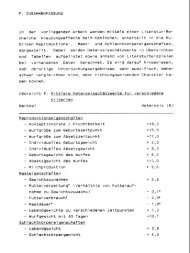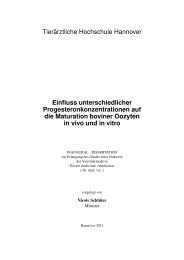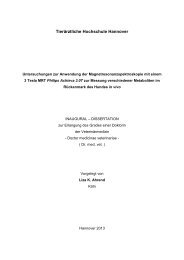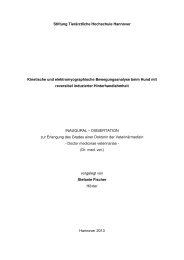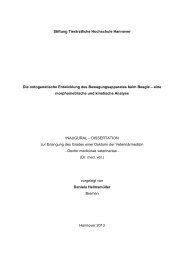Aus der Arbeitsgruppe Immunologie der Tierärztlichen Hochschule ...
Aus der Arbeitsgruppe Immunologie der Tierärztlichen Hochschule ...
Aus der Arbeitsgruppe Immunologie der Tierärztlichen Hochschule ...
Erfolgreiche ePaper selbst erstellen
Machen Sie aus Ihren PDF Publikationen ein blätterbares Flipbook mit unserer einzigartigen Google optimierten e-Paper Software.
7. Summary<br />
91<br />
Christine Kobelt: Summer eczema, a type I allergy in Islandic horses: Kinetics of in<br />
vivo-sensitisation of basophilic granulocytes monitored by means of<br />
a functional in vitro test (FIT)<br />
In this study Islandic horses raised and kept un<strong>der</strong> different conditions and of different age,<br />
with and without clinical symptoms sweet itch (summer eczema) were tested at various<br />
seasons for their degree of sensitisation by means of a functional in vitro test (FIT) developed<br />
by Susanne Kaul (1998).<br />
Focus was put on following questions to be answered:<br />
1. What about the type I sensitisation in horses, raised and living in an area without<br />
Culicoides spp. (Iceland) ?<br />
Twelve adult horses, born and living in Iceland, were studied: They showed measurable<br />
amounts of immunoglobulins on the surface of their basophils, capable of inducing a<br />
degranulation. All of them were “generally” sensitised with functional antibodies. This is the<br />
main precondition for the ability to react with a type I hypersensitivity. Four of the tested<br />
horses reacted strongly positive with allergen preparations <strong>der</strong>ived from different insects,<br />
excluding Culicoides nubeculosus.<br />
Upon challenge with different doses of Culicoides nubeculosus allergen 2 additional horses<br />
out of the twelve showed bor<strong>der</strong>line but clear positive reactions. This might be due to cross<br />
reactivities with originary icelandic insects (such as Simulium spp.), for sweet itch inducing<br />
Culicoides spp. do not exist in Iceland. Whether these cross reactions might indicate a cross<br />
sensitization resulting in enhanced susceptibility to sweet itch once exported to Culicoides<br />
areas could be elucidated by exposing them to Culicoides midges.<br />
2. How long will horses with sweet itch stay detectably sensitised, when kept in a<br />
Culicoides free region for a longer period of time (Spiekeroog) ?<br />
Even after 15 years on Spiekeroog without any clinical signs 17 affected horses still proved a<br />
clearly positive sensitisation of their basophils against Culicoides nubeculosus. They did not<br />
loose the principle ability to redevelop sweet itch upon new antigen contact, even after a long<br />
time (up to 15 years tested). Furthermore, all of the 26 examined horses showed a “general”<br />
sensitisation, due to the existence of antibodies capable of inducing a degranulation upon



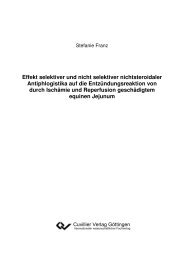
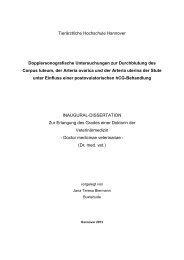

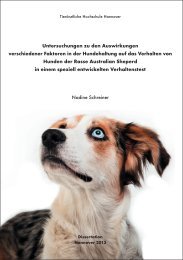
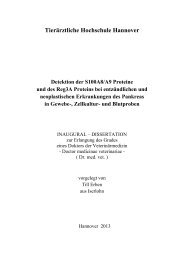


![Tmnsudation.] - TiHo Bibliothek elib](https://img.yumpu.com/23369022/1/174x260/tmnsudation-tiho-bibliothek-elib.jpg?quality=85)
